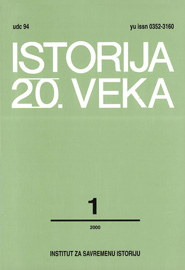PREOKRET KULTURNO-POLITIČKE LINIJE KPJ POSLE REZOLUCIJE INFORMBIRO-A
CHANGES IN THE YUGOSLAV COMMUNIST PARTY’S CULTURAL AND POLITICAL COURSE FOLLOWING THE CONFLICT WITH THE COMINFORM
Author(s): Aleš GabričSubject(s): Political history, Recent History (1900 till today), WW II and following years (1940 - 1949), Post-War period (1950 - 1989), History of Communism
Published by: Institut za savremenu istoriju, Beograd
Keywords: Yugoslavia; political course; communist party; Cominform conflict;
Summary/Abstract: In 1945 the imitation of Soviet models in Yugoslavia spread to the cultural and political sphere. The works of the best known Soviet ideologists and the theory of social realism became dominant. Translations of Soviet literature prevailed, Russian became a mandatory foreign language in schools, while Russian and modem Soviet artistic forms gained supremacy in the Yugoslav theater and movie production. The change in the cultural and political course came in 1949, and its consequences were soon felt in the programs of cultural institutions. Yugoslav cultural circles began turning their attention to Western trends. The changes in the cultural domain were formally confirmed at the plenary session of the Yugoslav Communist Party held towards the end of 1949, when Milovan Djilas explained the general turnabout. As a result, professional expertise gained greater importance in the political appraisal of artists and scientists. Individuals whose thoughts veered from official party ideology were thus given the chance to publish their ideas, and although this in no way threatened the acquired privileges of the Marxists it did make room for the expression of different views among the Communist theorists. Djilas was in favor of greater freedom of culture from the influence of politics, while Boris Ziherl was foremost among those who insisted on the need to maintain the inviolability of the Marxist dogma. Within a few years, however, the Communist elite, fearing that social liberalization might go too far and prove a threat to their monopoly, put a stop to the process of cultural reform. In the sphere of culture the ideas of the hitherto leading theorist Milovan Djilas were substituted by the dogmatic views supported by Boris Ziherl. The Communist Party thus showed that the time had not come yet for free cultural creativity, guided solely by the imagination and the aims of artists and scientists.
Journal: Istorija 20. veka
- Issue Year: 2000
- Issue No: 1
- Page Range: 101-108
- Page Count: 8
- Language: Serbian

